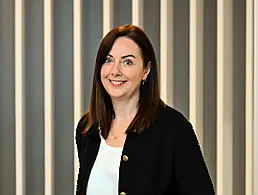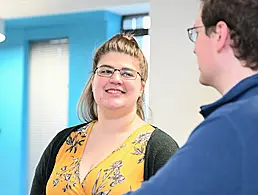It can be hard to know what computer science graduates can expect from graduate programmes. Luckily, Liberty IT is here to shed some light on things.
’Tis the season to be recruiting graduates, as educational institutes host graduate fairs, companies vie for students’ attention and graduates search for their first step on the career ladder.
With the tech talent gap still very much a problem, some of the biggest tech organisations in the country are already out in force, trying to attract the very best talent.
While there is plenty of information out there for graduates to learn about the kind of work these companies do, it can be hard to know the nitty gritty of what their internship or graduate programme will entail.
Computer science and information technology students in particular can often be left wondering what kind of technologies they’ll get to work with or what their actual day-to-day job will look like.
Stephen Killilea, senior talent acquisition specialist at Liberty IT, filled us in on what kind of office environment a software engineer can expect.
“Luckily, the days of software engineers sitting in dark corners behind a pyramid of coffee cups are now behind us,” he said.
“Most tech companies have office environments that are spacious, open and bright with breakout areas that enhance collaboration across all project teams in the office and provide you with the perfect opportunity to pick a more senior engineer’s brains about their most recent work.”
Support is there
Killilea said that while graduates from a computer science background often come with a high level of knowledge, most organisations understand that students will need some support along the way.
“At Liberty IT, we take this support very seriously. All students who join us will take part in our five-week graduate academy, where they are provided industry-leading training in a variety of technologies while working on a live application that we will use in the company after the academy.”
For computer science graduates and budding software engineers, the kind of technology they will be working on is an important factor.
Killilea said most organisations will try to start you in a project team where you are working with a technology stack you like, but this is not always possible.
“If you are particularly passionate about a tech stack or a particular programming language then make sure to do your research before you apply for jobs,” he said.
“To get a feel of the technologies a company is currently working with, try having a quick look at some of the more experienced engineers’ LinkedIn profiles or check out their open vacancies which should give some insight into the technologies used in the business.”
Ace your interview
Once graduates or interns have selected their perfect programme and applied, they’ll need to prepare for their interview, which, for a computer science student, will almost definitely include technical questions.
Killilea said from his own experience, the most successful interviewees use a whiteboard when approaching technical questions. “A quick sketch of the architecture or design of a recent university or placement project, including the main technologies they worked on, provides a great base for them to showcase the full range of their technical ability.”
He also said that candidates may be faced with a coding assessment. “You can prepare by trying out as many trial coding assessments on websites such as Codility and HackerRank which will give you the feel of what the assessment may feel like.”
Liberty IT is hosting a Tech Carnival event on Wednesday, 11 October in Belfast and Thursday, 12 October in Dublin to introduce you to its technologies and answer questions about its graduate and intern programmes.




